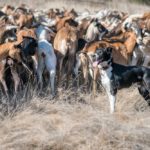Traditionally, hunters have used dogs to assist in sneaking up on prey and yielding a better quality as well as quantity of food. This has been passed down through generations and is still a bonding experience for dogs and owners around the country.
In spite of ethical debates and concerns about the environmental impact of hunting squirrels, the back-to-basics approach is something that appeals to many individuals and continues to be a form of family bonding.

You can train almost any dog to hunt squirrels, although some breeds take to it a lot more naturally than others. Common breeds used with squirrel training include beagles and mountain curs, who were historically bred for their uses within the hunting process.
There are different techniques that have been developed to generate the most effective hunting dog that enjoys what it does, as well as is highly successful.
This article covers some famous influences such as tips from celebrity dog trainers and ways in which you can find what works best for your dog.
If you are interested in teaching your dog to become more accustomed to squirrels and bring out the hunting instinct, this is a great place to start.
Squirrels are natural prey for many dog breeds because of the usual size difference, and the fact that dogs tend to look at the ground when they are walking.
Another reason is that dogs usually like to chase small things that scuttle and move fast.
Many will see the process as a game and will enjoy pleasing their owner, not to mention benefit from positive reinforcement through treats, praise, and affection.
Training your dog to hunt squirrels can also be a great way to spend more time with your dog, and strengthen the bond between you.
Dog Trainers
Some of the first steps to training your dog are commonly noted by the highly esteemed Allen Franklin, who is known for his widespread success.
Franklin’s approach highlights the importance of baseline commands, such as teaching your dog the “speak” command.
Rewarding them when they are able to bark following the command is useful when in the wilderness because you can encourage them to “speak” when there is a squirrel in a tree.
This is one of the fundamentals for squirrel training, according to Franklin, and also encourages your dog to practice looking up and get used to using their nose and eyes to look for squirrels.
Start Young
As with any form of dog training, there are benefits to starting at a young age.
Owners or trainers emphasize the importance of beginning training young because it is easier to reinforce the correct behavior and takes fewer repeats to engrain into the dog’s long-term memory.
Of course, this isn’t always practical, especially if you want to rescue an older dog. This is why there are many ways that you can encourage your older dog to engage in squirrel training.
An important factor is to use motivation and get their attention with it, such as a nice smelling treat.
One of the drawbacks that are commonly associated with older dog training is that they already have other habits and behaviors that are deeply ingrained into them.
This is usually the case, which is why it takes a little more work and association to train them.
It’s important to remain patient and use a lot of positive reinforcement and encouragement when training any dog, especially if they are a bit older. They aren’t likely to do what you need them to if you get frustrated, so you need to keep your patience with them at all times.
Get Them Used To Squirrels
Another essential thing when beginning squirrel training is to get your dog used to the scent and sight of squirrels.
Encourage them when they find one by giving them lots of pets and fuss, and they will gradually begin to associate squirrels and the process of finding them with treats and rewards.
They will also begin to feel motivated to find more squirrels and track them down for hunting on their own accord, eventually without the need for reinforcement.
However, you can keep giving them treats for good work if you like.
Positive Reinforcement
This has been covered briefly, but it’s worth noting the necessity of positive reinforcement when training your dog in any way.
This will keep them engaged by being able to associate their behavior with rewards, as well as motivate them to do more of it. Another way to engage them if they have particularly short attention spans is to use treats that have a distinct smell.
Try to only use these when taking your dog squirrel hunting, that way they will know that they will get those particular treats when they engage and track down squirrels.
They will begin to associate the treats with the experience and want to do it more often in order to get them. This basic form of association and reinforcement with treats is an extremely effective way to teach your dog habits and train them.
Repeated Exposure
The importance of repeated exposure to dogs when training cannot be stressed enough. Their memories are a lot shorter than ours, so it can be hard for us to remember that they need more time to take it all in.
If your dog is older and no longer a puppy, this is an especially important stage because they may take a longer time to benefit from reinforcement.
Experts have said that it’s better to do several shorter sessions per week than one or two longer sessions. It is more important for your dog to train by creating memories and exposing them to squirrels as often as possible.
Best Breeds
We’ve highlighted some of the breeds which are most suitable for squirrel training, but some others are listed here.
Traditionally, some of these breeds were used in other types of hunting, and they have the basic temperament, personality, and cognitive stamina to make the perfect hunting companion.
Whether you are looking for a specific type of dog to take squirrel hunting, or you want to know how suitable your family dog will be, it all comes down to personality and how easy they are to train in general.
Not to mention, the survival instincts and hunting genes make certain behaviors more natural to some dogs than others. Beagles, fox terriers, Norwegian elkhounds, mountain curs, American blue Gascon hounds are all predisposed to be the best squirrel hunting dogs.
To summarize, there are many factors to consider when preparing for squirrel training. These include treats, breeding, and the age of your dog.
For some, instinct can kick in, and they will come into their own through the hunting process and will be able to hone in on their sniffing and tracking skills.
Although there are some ethical concerns over whether dogs enjoy hunting or not, historical evidence has shown that it is purely instinctual for certain breeds who enjoy the rewards.
Positive reinforcement is essential for building habits and creating new behavior habits, not to mention the bond that will be strengthened between you and your furry friend.
- 8 Signs That Your Dog Is In Heat - November 8, 2022
- Why Is My Dog Whining Whilst Carrying A Toy In Their Mouth? - August 17, 2022
- Reasons Why Your Dog’s Poop Is White And What To Do About It - August 17, 2022









